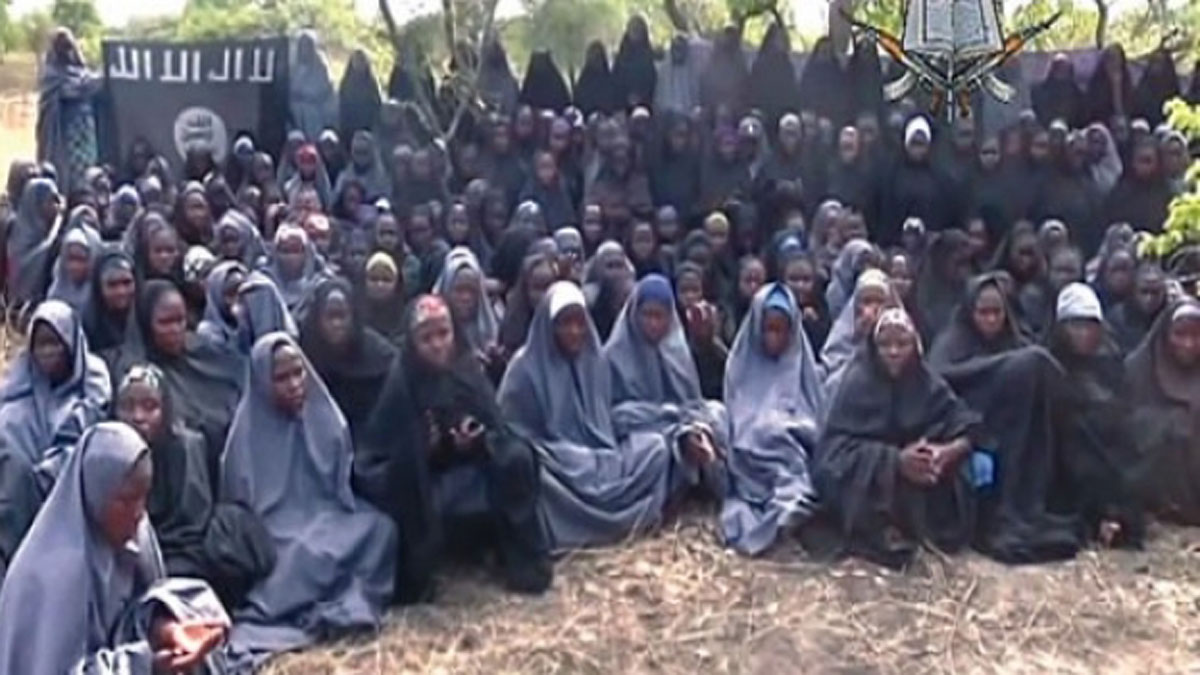Boko Haram: kidnapped schoolgirls 'forced to become militants'
Survivors say some of the Chibok girls have been brainwashed into fighting for the Nigerian Islamist group

A free daily email with the biggest news stories of the day – and the best features from TheWeek.com
You are now subscribed
Your newsletter sign-up was successful
Some of the school girls captured by Boko Haram last year have been forced to fight for the terrorist group and have been brainwashed by Islamist militants, according to other captives who have escaped.
Witnesses told BBC Panorama that some of the young girls kidnapped from Chibok last year were being used to terrorise the other captives and carry out floggings and even murders.
One of the survivors who escaped described what happened after she refused to marry one of the militants: "[The girls] came back with four men, they slit [the mens'] throats in front of us. They then said that this will happen to any girl that refuses to get married."
The Week
Escape your echo chamber. Get the facts behind the news, plus analysis from multiple perspectives.

Sign up for The Week's Free Newsletters
From our morning news briefing to a weekly Good News Newsletter, get the best of The Week delivered directly to your inbox.
From our morning news briefing to a weekly Good News Newsletter, get the best of The Week delivered directly to your inbox.
Another escapee said: "The ones I've seen are totally heartless. Even the men avoid them because they are scared."
But neither woman blamed the girls for what they did, saying they had been brainwashed by the militants. "It's not their fault, they were forced to do it," said one. “Anyone who sees the Chibok girls has to feel sorry for them."
Amnesty International estimates that the terrorists have captured more than 2,000 women and girls since the beginning of last year. The largest single abduction occurred when the 276 schoolgirls were taken from Chibok in April, sparking an international outcry.
Captives are subjected to rape, torture, forced marriage and religious conversion, with some being sold on as sex slaves. "The abduction and brutalisation of young women and girls seems to be part of the modus operandi of Boko Haram," Amnesty's Netsanet Belay told The Guardian.
A free daily email with the biggest news stories of the day – and the best features from TheWeek.com
The Nigerian military has launched an assault on the Islamists in their stronghold in the north of the country, managing to rescue hundreds of captives in recent months.
But survivors now face the "mammoth task" of coming to terms with the horrors they experienced, says the BBC's Tulip Mazumdar.
"I can't get the images out of my head," one victim told her. "I see people being slaughtered. I just pray that the nightmares don't return."
-
 Bad Bunny’s Super Bowl: A win for unity
Bad Bunny’s Super Bowl: A win for unityFeature The global superstar's halftime show was a celebration for everyone to enjoy
-
 Book reviews: ‘Bonfire of the Murdochs’ and ‘The Typewriter and the Guillotine’
Book reviews: ‘Bonfire of the Murdochs’ and ‘The Typewriter and the Guillotine’Feature New insights into the Murdoch family’s turmoil and a renowned journalist’s time in pre-World War II Paris
-
 Witkoff and Kushner tackle Ukraine, Iran in Geneva
Witkoff and Kushner tackle Ukraine, Iran in GenevaSpeed Read Steve Witkoff and Jared Kushner held negotiations aimed at securing a nuclear deal with Iran and an end to Russia’s war in Ukraine
-
 Epstein files topple law CEO, roil UK government
Epstein files topple law CEO, roil UK governmentSpeed Read Peter Mandelson, Britain’s former ambassador to the US, is caught up in the scandal
-
 Iran and US prepare to meet after skirmishes
Iran and US prepare to meet after skirmishesSpeed Read The incident comes amid heightened tensions in the Middle East
-
 Israel retrieves final hostage’s body from Gaza
Israel retrieves final hostage’s body from GazaSpeed Read The 24-year-old police officer was killed during the initial Hamas attack
-
 China’s Xi targets top general in growing purge
China’s Xi targets top general in growing purgeSpeed Read Zhang Youxia is being investigated over ‘grave violations’ of the law
-
 Panama and Canada are negotiating over a crucial copper mine
Panama and Canada are negotiating over a crucial copper mineIn the Spotlight Panama is set to make a final decision on the mine this summer
-
 Why Greenland’s natural resources are nearly impossible to mine
Why Greenland’s natural resources are nearly impossible to mineThe Explainer The country’s natural landscape makes the task extremely difficult
-
 Iran cuts internet as protests escalate
Iran cuts internet as protests escalateSpeed Reada Government buildings across the country have been set on fire
-
 US nabs ‘shadow’ tanker claimed by Russia
US nabs ‘shadow’ tanker claimed by RussiaSpeed Read The ship was one of two vessels seized by the US military